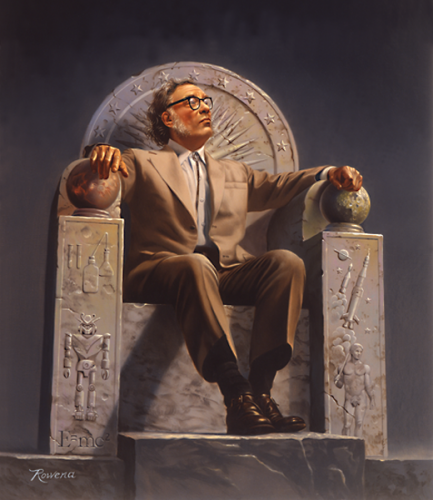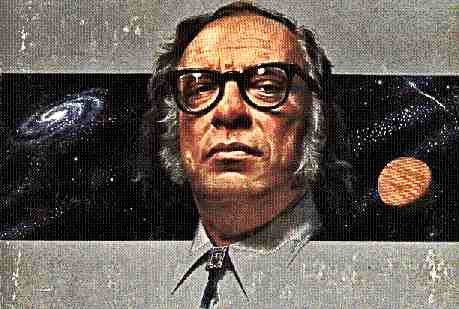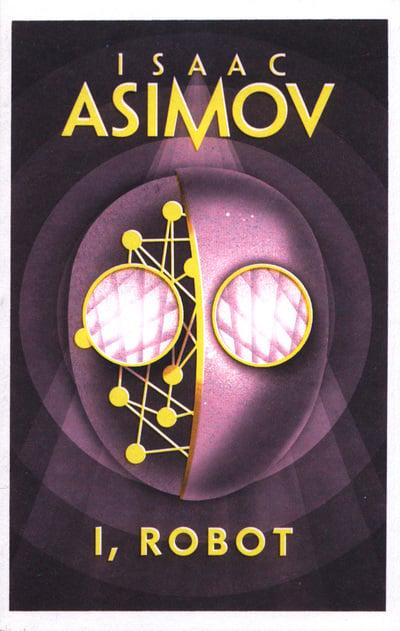18 Search Results Found For: "isaac asimov"
Here's the top MCS tags found for "isaac asimov"
Isaac Asimov’s…
Tags:Fantasy - Science Fiction, Isaac Asimov, Magazine Covers
isaac asimov – pocket computer
Tags:Advertisements, Computers, Isaac Asimov
Isaac Asimov
Tags:Awesome Things, Books, Isaac Asimov
Apple Commits to Asimovs FOUNDATION
Tags:Books, Fantasy - Science Fiction, Foundation, Television
I’m excited to see how they do this, the series of books got really bonkers in the last couple.
Bicentennial Man
Tags:Movie Posters, Movie Reviews, Movies, Robin Williams
This is one of my more favorite adaptations from Isaac Asimov’s vast library of stories, no huge sweeping action scenes, no massive explosions, just the ever moving forward progress of a mind finding it’s way to sentience, then trying to find it’s way through a word that might not be as accepting of his soul as he’d like it to be. For the most part all the characters in the film are acting in good faith and the worst parts of humanity never get put on display, something that “A.I. Artificial Intelligence” did aplenty just a couple years after “Bicentennial Man” came out.
It’s a sad but heart warming story, easily one of Robin’s more rewatchable films.
Foundation for only $3.00
Tags:Books, Foundation, Television
WINNER OF THE HUGO AWARD FOR BEST ALL-TIME SERIES
The Foundation series is Isaac Asimov’s iconic masterpiece. Unfolding against the backdrop of a crumbling Galactic Empire, the story of Hari Seldon’s two Foundations is a lasting testament to an extraordinary imagination, one whose unprecedented scale shaped science fiction as we know it today.
The Galactic Empire has prospered for twelve thousand years. Nobody suspects that the heart of the thriving Empire is rotten, until psychohistorian Hari Seldon uses his new science to foresee its terrible fate.
Exiled to the desolate planet Terminus, Seldon establishes a colony of the greatest minds in the Empire, a Foundation which holds the key to changing the fate of the galaxy.
However, the death throes of the Empire breed hostile new enemies, and the young Foundation’s fate will be threatened first.
There’s a TV series coming soon based on this book, so if you want the full story, this is likely the only way. I’ve read the entire series and I’m a huge fan of Asimov, so of course I’d recommend this to you!
“I Robot” for only 2
Isaac Asimov’s ROBOT series – from the iconic collection I, ROBOT to four classic novels – contains some of the most influential works in the history of science fiction. Establishing and testing the THREE LAWS OF ROBOTICS, they continue to shape the understanding and design of artificial intelligence to this day.
What happens when a robot begins to question its creators? What would be the consequences of creating a robot with a sense of humour? Or the ability to lie? How do we truly tell the difference between man and machine?
In I, Robot, Asimov sets out the Three Laws of Robotics – designed to protect humans from their robotic creations – and pushes them to their limits and beyond.
Following genius robopsychologist Dr. Susan Calvin and engineers Powell and Donovan, these short stories helped to transform artificial intelligence from a dream into a science and changed perceptions of robots for ever.
How the World is Most Likely to End
Behold, the apocalypse!
Scientists and self-appointed prophets agree that the world is coming to an end. Well, not the world as in Planet Earth but the world of humanity. Or, as the great philosopher and social critic George Carlin said:
It’s apocalypse o’clock, peeps. The way things are standing today, we are en route to an inevitable end. When will the end come, and what will bring it? Let’s take a look at some of the most popular apocalypse scenarios today.
Climate change
Climate change is the apocalypse with the best-sounding name. Compared to “nuclear holocaust” or “plague”, it almost seems benign – but its effects are not. Perhaps it would be a good idea to change its name to “climate apocalypse” – it would perhaps make more people realize what it means.
(Photo: icheinfach / Pixabay)
In a nutshell, climate change can lead to an entire series of spectacular and deadly events, all of them out to terminate human life – or life, altogether – on Earth. These range from “heat death” – when the temperatures become too high for us humans to be able to survive – to water scarcity, food scarcity, the rapid spread of various diseases that, as society collapses on itself, will be next to impossible to control, will decimate the population. Yet the most spectacular scenario is the one related to massive quantities of methane being released from the underwater stores in the oceans that, when ignited by lightning storms, would explode in a violent manner that puts even the biggest nuclear explosions to shame, destroy the ozone layer, and the remaining life in the oceans – in short, it would burn us first, then cook us slowly in cosmic radiation.
Artificial intelligence
Surprising as it may sound, artificial intelligence is more likely to wipe us out than a giant asteroid. In a report published in 2015, researchers from Oxford University have shown that there is a 1 in 10 chance that AI will end us all simply because it has no use for us. Then again, a global AI overlord taking over our lives could be overall beneficial for the life and thriving of humanity. Thus, it’s far more likely for us to have a world similar to the one depicted in Isaac Asimov’s novels than one like in the Terminator movies.
(Photo: 024-657-834 / Pixabay)
The scientists compiling the report have admitted that AI is the area with the largest uncertainties – there’s no way to predict if or when our robot overlords will take over the world.
The usual suspects
Finally, let’s take a look at the “usual suspects” that seem never to go out of style: nuclear war, a deadly disease, and the global collapse of society (possibly caused by the first two). While the latter is unlikely to end humanity, the former two do have the potential to wipe us out completely.
Back when the arms race was ongoing between the two big powers – the USA and the Soviet Union – the idea of mutually assured destruction successfully kept the apocalypse at bay. Now, in turn, there are eight, maybe nine countries with nukes ready to deploy. And at least two of them – India and Pakistan – are involved in military conflicts.
A deadly disease pandemic – intended or not – is another possibility that’s relatively plausible today. We’ve seen viruses spread like wildfire across the world in the last two decades – think of the H1N1, the MERS epidemic, Ebola, and now the novel coronavirus. As the example of the coronavirus has shown us, we are pretty much unprepared for a new, deadly, successful disease – one that spreads rapidly and survives in a range of environments and has a long incubation period and is fast to mutate.
This was the last time we walked on the moon.
Tags:Avatar (2009), Isaac Asimov, Quotes
Individual science fiction stories may seem as trivial as ever to the blinder critics and philosophers of today — but the core of science fiction, its essence, the concept around which it revolves, has become crucial to our salvation if we are to be saved at all.
-Isaac Asimov
“My Own View” in The Encyclopedia of Science Fiction (1978) edited by Robert Holdstock; later published in Asimov on Science Fiction (1981)























